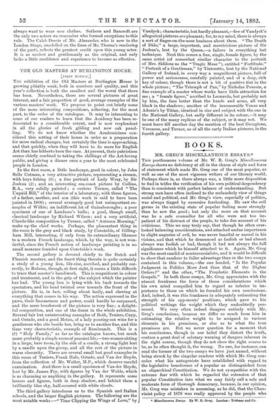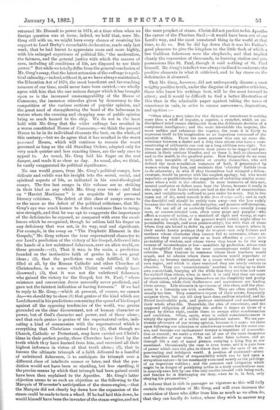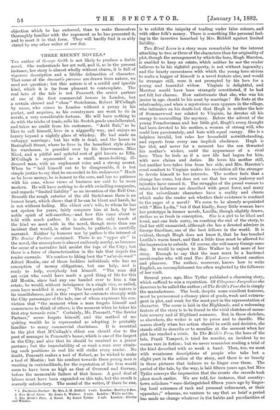BOOKS.
MR. GREG'S MISCELLANEOUS ESSAYS.* THIS posthumous volume of Mr. W. R. Greg's Miscellaneous Essays shows no deficiency at all in the charm of style and force of statement which made Mr. Greg one of the most popular, as well as one of the most vigorous writers of our literary world.. Perhaps there is, as there always was, a little more disposition to find in trifles the verification of his own political despondency than is consistent with perfect balance of understanding. But strong men have often inclined to the melancholy view of things. social and political, and Mr. Greg's view, especially of politics, was always tinged by excessive foreboding. He saw the evil germs in the existing state of popular feeling more strongly than he saw the good ; but only the more on that account was he a safe counsellor for all who were not too im- patient of his distrust of the people, to take due account of his criticisms. This we may truly say, that though he often over- looked balancing considerations, and attached undue importance to slight auguries of evil, he was never fanciful or unreal in his visions, and that which he denounced as foolish or bad almost always was foolish or bad, though it had not always the full significance which he himself attached to it. Again, Mr. Greg was the most candid of controversialists, and it would be difficult to show that candour to fuller advantage than in the two essays. contained in this volume,—the one headed, " Is the Popular Judgment in Politics More Just than that of the Higher Orders ?" and the other, "The Prophetic Elements in the. Gospels." In both these essays, Mr. Greg appreciates with the utmost frankness the force of those considerations which his own mind compelled him to regard as inferior in im- portance to those on which he founded his own conclusions.. And, indeed, it was this frankness in adequately estimating the. strength of his opponents' positions, which gave to his political writings the weight which they undoubtedly pos- sessed. We very often indeed disagree entirely with Mr.. Greg's conclusions, because we differ so much from him in estimating the relative weight to be assigned to various elements in his premisses, or else as to what the true. premisses are. But we never question for a moment that his conclusions, though in our belief they distort the truth, contain a great deal of salutary warning of dangers inherent in the right coarse, though they do not show the right course to. be, as he often thought it, the wrong. No one, for instance, can. read the former of the two essays we have just named, without being struck by the singular candour with which Mr. Greg con- cedes what his antagonists have established with regard to the legislative beneficence of a popular as distinguished from, an oligarchical Constitution. We do not sympathise with the extreme fear with which he regarded the extension of that popular Constitution into what we may fairly call a safe and moderate form of thorough democracy, because, in our opinion, Mr. Greg was mistaken in assuming, as he did, that the Chau- vinist policy of 1878 was really approved by the people who
* Missolioneous Essays. By W. R. Greg. London Trabner and Co.
returned Mr. Disraeli to power in 1874, at a time when when no foreign question was at issue; indeed, we hold that, were Mr. Greg still with us, we might have every chance of receiving his support to Lord Derby's remarkable declaration, made only last week, that he had learnt to appreciate more and more highly, with his enlarged experience of political life, "the moderation, the fairness, and the general justice with which the masses of men, including all conditions of life, are disposed to use their power." But while we totally differ from the general conclusion of Mr. Greg's essay, that the latest extension of the suffrage is apoli- tical calamity,—indeed,without it, as we have always maintained, the Education Act of 1870, the most beneficent and far-reaching measure of our time, could never have been carried,—we wholly agree with him that the one serious danger which it has brought upon us is the increased unmanageability of the House of Commons, the immense stimulus given by democracy to the competition of the various sections of popular opinion, and the great need of strengthening the hand of the helmsman in waters where the crossing and chopping seas of public opinion bring so much hazard to the ship. We do not in the least hold with Mr. Greg that the wider suffrage has resulted in a worse constituted House of Commons,—we think the present House to be in its individual elements the best, on the whole, of this century,—but we do agree that it has resulted in the worst governed House, which will continue to remain the worst governed so long as the old Standing Orders, adapted only for very much quieter and less exacting times, are the only ones to appeal to. As usual, Mr. Greg laid his finger on the real danger, and made it as clear as day. As usual, also, we think, he vastly exaggerated its political significance.
No one would guess, from Mr. Greg's political essays, how delicate and subtle was his insight into the moral, social, and spiritual aspects of life, as indicated in his semi-theological essays. The five last essays in this volume are as striking in their kind as any which Mr. Greg ever wrote ; and that on " Harriet Martineau " is an exquisite bit of personal literary criticism. The defect of this class of essays seems to us the same as the defect of the political criticisms, that Mr. Greg's eye was much keener to detect weakness than to recog- nise strength, and that he was apt to exaggerate the importance of the deficiencies he exposed, as compared with even the excel- lences which he recognised, though he seldom laid his finger on any deficiency that was not, in its way, real and significant. For example, in the essay on " The Prophetic Element in the Gospels," Mr. Greg refuses the true supernatural character to our Lord's prediction of the victory of his Gospel, delivered into the hands of a few unlettered fishermen, over an alien world, on three grounds :—(1), That it was, in the main, a prediction founded on the instinctive faith of genius in its own great ideas ; (2), that the prediction was only fulfilled, if ful- filled at all, by the Roman Catholic and other Churches of Christendom, in a sense which Christ would utterly have disowned ; (3), that it was not the unlettered fishermen who gained the victory for the Gospel, but St. Paul, " whose existence and conversion Jesus assuredly never predicted, and gave not the faintest indication of having foreseen." If we had to reply to Mr. Greg,—which at present, of course, we cannot do,—we should try to show (1) that genius of the kind which our Lord showain his predictions concerning the spread of his Gospel against all the opposing tendencies of the world, was genius grounded on the clear discernment, not of human character or power, but of God's character and power, and of those alone ; and that such genius is genius of the supernatural order, indi- cating a kind of communion with the supernatural which is everything that Christians contend for; (2), that though no Church, Catholic or Protestant, may have carried out Christ's ideas in their perfect purity, those Churches have lived by the troth which they have learned from him, and exercised all their highest influence in virtue of that truth alone ; (3), that to foresee the ultimate triumph of a faith delivered to a handful of unlettered fishermen, is to anticipate its triumph over a different class of intellects sooner or later, and that the pre- diction would not have been so startling, but less startling, if the precise means by which that triumph had been gained could have been then explained to the Apostles. Mr. Greg's latter objection seems to us such an objection as the following to the Marquis of Worcester's anticipation of the steam-engine,—that the Marquis did not clearly hay down bow the expansion of the steam could be made to turn a wheel. If he had laid this down, he would himself have been the inventor of the steam-engine,and not the mere prophet of steam. Christ did not predict to his Apostles the career of the Pharisee Saul ;—it would have been out of our Lord's way, and the most unnatural thing in the world at that time, to do so. But he did lay down that it was his Father's good pleasure to give the kingdom to the little flock of which a few Galilean fishermen were the shepherds, and that implied clearly the conversion of thousands, in learning station and pre- possessions like St. Paul, though it said nothing of St. Paul himself. Mr. Greg's intellect was always inclined to underrate the positive elements in what it criticised, and to lay stress on the deficiencies it observed.
That Mr. Greg, however, did not unfrequently discern a most weighty positive truth, under the disguise of a negative criticism, those who know his writings best, will be the most forward to attest ; and it would be difficult to find a better illustration of this than in the admirable paper against taking the name of conscience in vain, in order to excuse narrowness, dogmatism, and egotism :—
" Often what a man takes for the dictate of conscience is nothing more than a whiff of impulse, a caprice, a crotchet, which an un- disciplined mind cannot distinguish from the deliberate decision of a competent intelligence; and the more irresistible the impulse, the more sudden and vehement the caprice, the more it is likely to represent itself to his imagination as an imperious command of the monitor within. There are some persons who can no more dis- criminate between a desire and a duty than others who have a mere smattering of arithmetic can cast up a long addition sum right. Yet these are precisely the characters most prone to be dogged and per- sistent in their noxious blunder, and to dress it, both to themselves and to the world, in the gaudiest guise. How frequently do we meet with men incapable of injustice or cruelty themselves, who will defend the most scandalous instances of both, if perpetrated by women whom they love, and maintain that chivalry' forbids them to do otherwise ; or who if they themselves had wronged a fellow- creatnre, would be prompt with the amplest apology, but who would repudiate as pusillanimous the suggestion of enforcing similar atone- ment when a wife is the offender. In most instances of this sort, mental confusion or defect must bear the blame, because it really is the origin of the faults which are laid at the door of conscientious- ness, and unrighteonsly suffered to pass under its name. But in five cases out of six, mere conceit is the fors et origo mall ; and in such the deceitful veil should be rudely torn away—not the less rudely because the deceit is often self-deception, and genuine self-deception, too. We are all of us probably familiar with men—usually young men, or narrow-minded men, often mere prigs and puppies—who affect a course of action, or a standard of right and wrong, at vari- ance not only with that of the general world (which might often be permissible enough, and even praiseworthy), but with that of those whom they are bound to defer to, and cannot but respect, whom in their secret hearts perhaps they do respect—not only fathers and mothers whose character they cannot fail to reverence, whose ex- perience they must recognise as at least affording a prima facie probability of wisdom, and whose views they know to be the very reverse of inconsiderate or low—moralists by profession, whose tone and thoughtful depth only the most presumptuous could dare to criticise. They venture to condemn where their teachers would acquit, and to admire where these teachers would reprobate or deplore ; to become enthusiasts in a cause which older and wiser men regret, and which in riper manhood they are nearly certain to abandon. They are 'conscientiously' resolute in acting up to their own convictions, fancying all the while that they are true and more far-sighted than others, when in truth it is only that they nre more inexperienced, and pluming themselves on the simplicity and purity of their vision, while their shallowness and narrowness are leading them astray. Life abounds in specimens of this class, and the char- acter is a favourite one with novelists. They are often cured, but usually too late. They sometimes repent of their errors, frequently outgrow them, but not till they have done endless mischief, and in- flicted incalculable pain, and perhaps embittered and embarrassed their whole after-life. Meanwhile, the plea of conscience, and the supposed obligation of obeying the orders it issues as those of a despot by divine right, enable them to escape alike condemnation and contrition. Often, again, what is called conscientiousness is simply the egotism of a wilful and intolerant nature. We are pas- sionate advocates of our wrong opinion, because it is ours ; we insist
upon following our mistaken or mischievous course for the same rea- son, and because our unchastened temper is impatient of contradic- tion or control; we make a virtue out of one of the most dangerous
and offensive of our vices. We sail under false colours, and go through life a sort of moral pirates, carrying a lying flag at our
masthead. Occasionally the case is even worse, and it is pure love
of power which uses the plea to throw dust into the eyes of an un- penetrating and indulgent world. A position of command—about the weightiest burden of responsibility which can be laid upon a scrupulous nature—is too constantly exercised merely as the privilege of an imperious volition ; and the pressure and obligation which might be in danger of paralysing action in a truly conscientious man is scarcely even felt by one who only credits himself with being such, and fancies he is discharging his duty, when he is, in fact, only obeying his propensities."
A volume that is rich in passages as vigorous as this will fully sustain the reputation of Mr. Greg, and will even increase the conviction of those who differ from him as much as we often do, that they can hardly do better, where they wish to answer any objection which he has endorsed, than to make themselves thoroughly familiar with the argument as he has presented it, and to meet it in that form. They will hardly find it so ably stated by any other writer of our day.








































 Previous page
Previous page